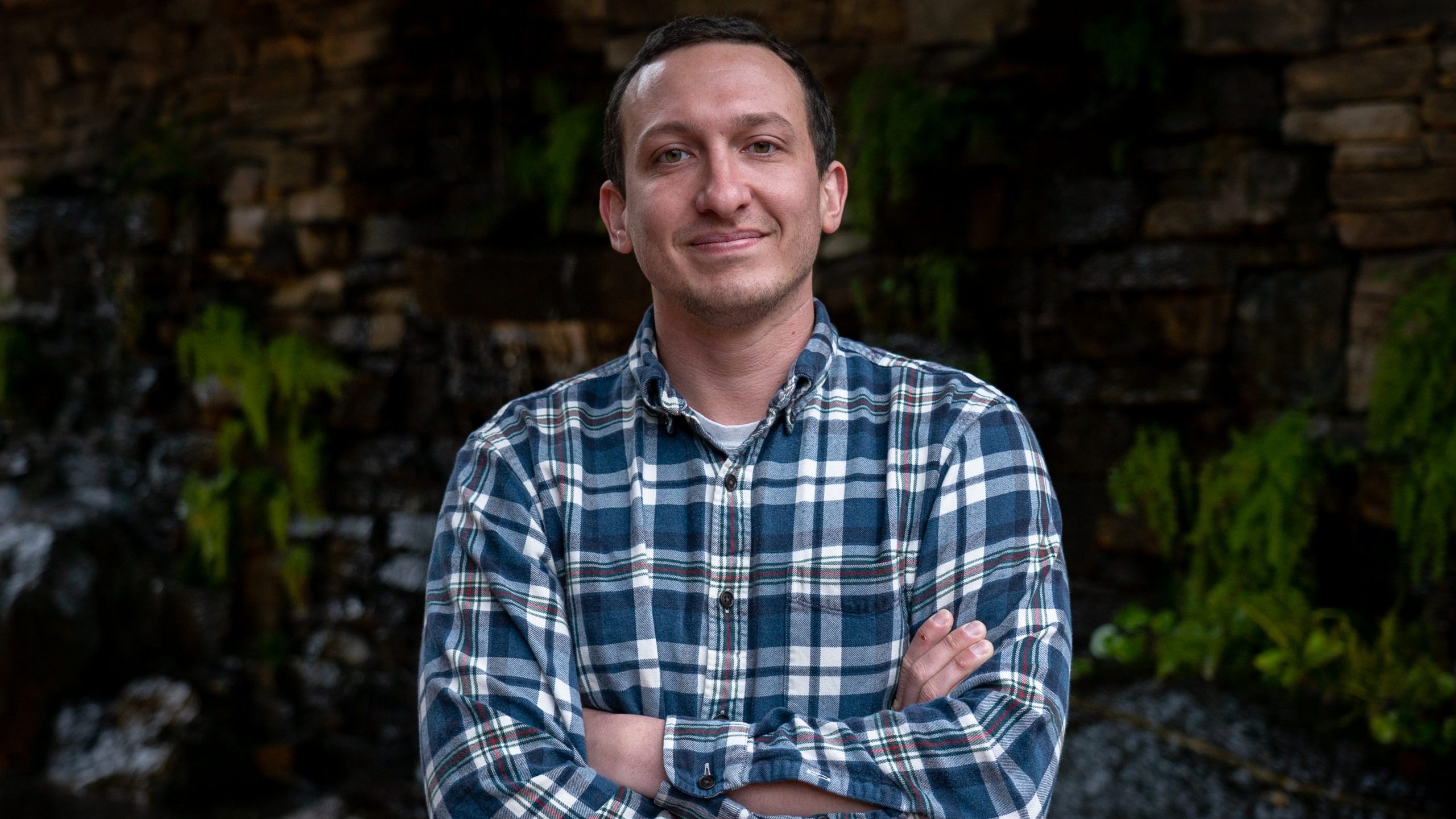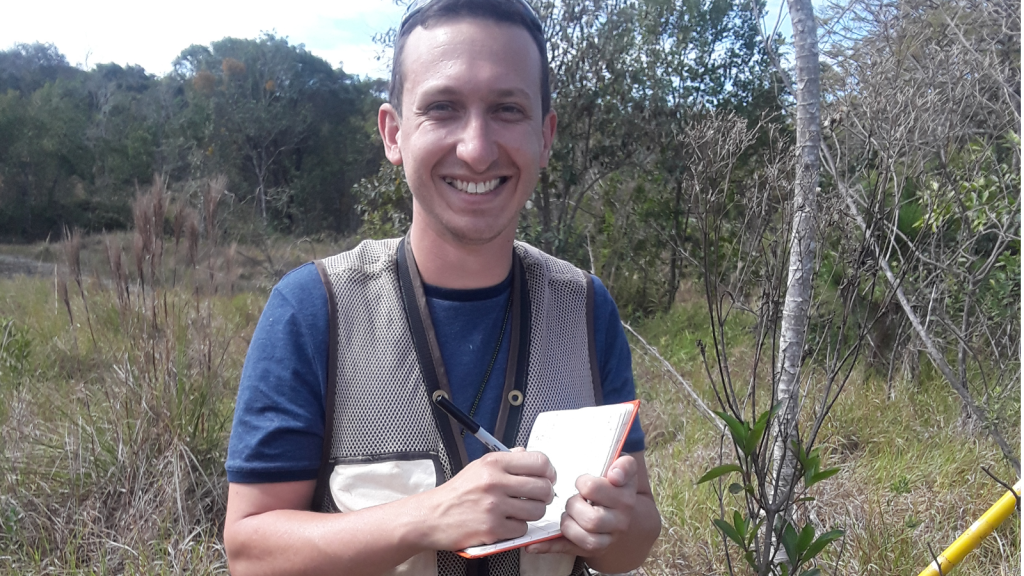Researcher Spotlight – Sam Flake

2019-20 Global Change Fellow
PhD Student, Department of Plant and Microbial Biology
Advisor: Dr. William Hoffman
Every year the Southeast Climate Adaptation Science Center funds a multi-disciplinary cohort of Global Change Fellows representing colleges across NC State University. Here are some highlights about 2019-20 Fellow, Sam Flake, and the applied research he’s conducting.
About You
What do you study?
I study how disturbances affect forests and woodlands, especially in places that don’t have complete forest canopies. At the moment, I am studying feedbacks between fire and vegetation in Brazilian savannas (grassy ecosystems with scattered trees): How does fire affect vegetation structure (how much tree cover and how it’s distributed), and how does that vegetation structure affect fire behavior (for example, by creating shade that reduces grass biomass needed as fuel for fires)? Predicting which sites will be forested in 100 years is complicated in temperate zones, but in the tropics the problem is compounded by complex feedbacks between plants and disturbance regimes. My goal is to improve our understanding of some of these feedbacks and advance our models of vegetation change in savanna/forest mosaics.
What (or who) influenced you to go into this field of study?
I began my research career working with birds and their distribution, behavior, and conservation, due to the influence of some good friends and my undergraduate advisor, who taught ornithology and encouraged me to pursue ecology. I switched to working with trees after realizing that the questions I’m interested are best studied in plants – and after realizing that waking up at 4 AM to find birds isn’t the lifestyle for me.
What do you think is the most pressing issue related to global change?
Most global change issues are fundamentally related to how our resources are allocated. The issues that we study are solvable – or at least mitigable – with enough political will to spend money on them. Finding that will – or making the most progress we can with the political capital we have – is the most critical part of addressing the negative effects of global change.
What is your dream job?
Doing research at a university or for state or federal government. Something that lets me do a lot of field work, mentor students, and do both basic and applied work.
About Your Research

What results are you finding?
Savanna and forest trees differ substantially in key “functional traits,” or physical characteristics, that affect how they interact with fire and with each other. Forest trees grow faster and have greater leaf area – which means that, once fire is suppressed and forest trees start to colonize savannas, they can rapidly produce a lot of shade and kill off the savanna species. Savanna and forest also have different spatial structure – savanna trees grow in clumps, which might help protect them from fire, while forest trees are more evenly spaced out. This information improves our understanding of how savannas turn into forests in the absence of fire, but it is also feedstock for a simulation model I am in the early stages of developing to model vegetation-fire feedbacks.
Who will benefit from your research?
I hope that my research will be useful for managers who want to conserve fire-dependent ecosystems or specialized species like those found in savannas. In the long run, my work will help us understand what sites are suitable for savannas or for forests under changing conditions, and how to prioritize conserving them in healthy states by using fire or silviculture.
How can your research be used to inform management decisions?
There is a lot of interest these days in using prescribed fire for management, but in many areas we don’t have the basic information we need to give prescriptions for a given management goal. My research will help us understand what controls the rates of conversion from savanna to forest and how management actions can maintain old-growth savannas.
How would you describe your research to a 3rd grader?
Wildfires are common and they can have a big impact on forests. But there are some kinds of plants that are used to fire and even require it to survive. Those plants grow in savannas that burn often because they have a lot of grass that burns easily, and they can survive even with frequent fires. I look at what makes those fire-adapted trees different from trees that grow in forests. I’m especially looking at how those different kinds of trees affect grasses – for example, by making a lot of shade that the grass doesn’t like – because the grass can affect how fires spread.
About Your Global Change Fellow Experience
How do you expect the SE CASC Global Change Fellows Program to impact you and your work?
Being exposed to decision-making processes and how policies are evaluated has already affected my thinking on the kinds of research and communication I will pursue in the future. It has informed my conception of how applied research can be done and how to have it actually be applied, in particular the idea of co-production and incorporating research directly into the decision-making process, an idea which I hope I will be able to incorporate in the future.
What has been the most rewarding part of being a SE CASC Global Change Fellow?
The most rewarding part for me has been to learn from other researchers who I may never have met otherwise. It’s been a great opportunity to learn about other methods, study systems, and ways of thinking. It’s also been fantastic to learn about how Tribal nations approach resource management and global change, which will definitely stay with me after the fellowship.
What advice would you give to a student that is interested in getting involved in your field?
My path to ecology was driven by an interest in natural history, and I really do think that good questions come from spending time around the thing you want to study. So partially my advice would be to just go do stuff and think about it – teach yourself how to identify birds or care for plants or catch fish, or whatever strikes your fancy. There’s lots of field tech jobs during the summer or after undergrad that you can leverage those skills for, and those jobs will be some of the most fun you can have doing research.
